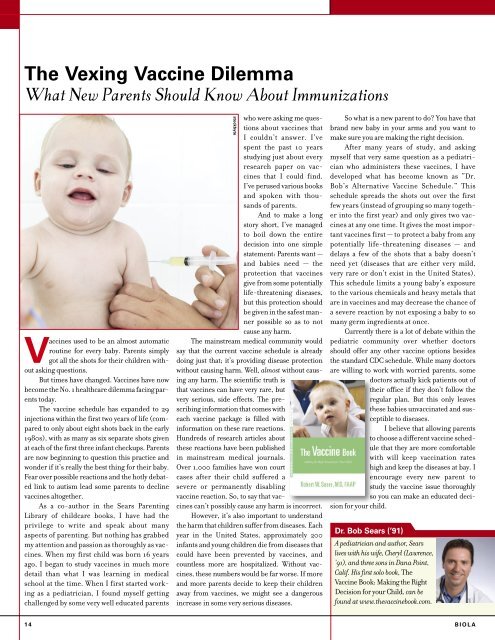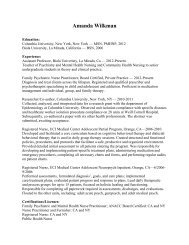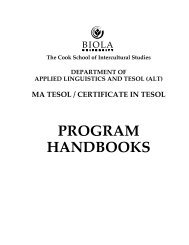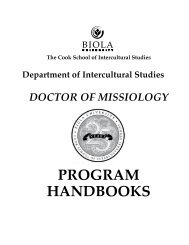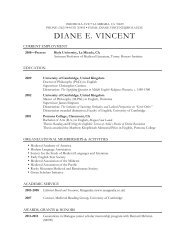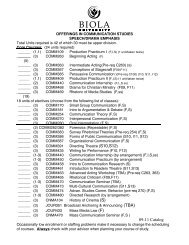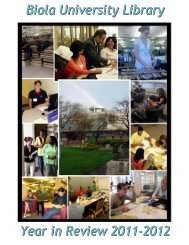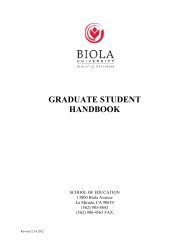In God We Trust? - Biola University
In God We Trust? - Biola University
In God We Trust? - Biola University
Create successful ePaper yourself
Turn your PDF publications into a flip-book with our unique Google optimized e-Paper software.
The Vexing Vaccine Dilemma<br />
What New Parents Should Know About Immunizations<br />
Vaccines used to be an almost automatic<br />
routine for every baby. Parents simply<br />
got all the shots for their children without<br />
asking questions.<br />
But times have changed. Vaccines have now<br />
become the No. 1 healthcare dilemma facing parents<br />
today.<br />
The vaccine schedule has expanded to 29<br />
injections within the first two years of life (compared<br />
to only about eight shots back in the early<br />
1980s), with as many as six separate shots given<br />
at each of the first three infant checkups. Parents<br />
are now beginning to question this practice and<br />
wonder if it’s really the best thing for their baby.<br />
Fear over possible reactions and the hotly debated<br />
link to autism lead some parents to decline<br />
vaccines altogether.<br />
As a co-author in the Sears Parenting<br />
Library of childcare books, I have had the<br />
privilege to write and speak about many<br />
aspects of parenting. But nothing has grabbed<br />
my attention and passion as thoroughly as vaccines.<br />
When my first child was born 16 years<br />
ago, I began to study vaccines in much more<br />
detail than what I was learning in medical<br />
school at the time. When I first started working<br />
as a pediatrician, I found myself getting<br />
challenged by some very well educated parents<br />
1 4<br />
who were asking me ques -<br />
tions about vaccines that<br />
I couldn’t answer. I’ve<br />
spent the past 10 years<br />
studying just about every<br />
research paper on vaccines<br />
that I could find.<br />
I’ve perused various books<br />
and spoken with thousands<br />
of parents.<br />
And to make a long<br />
story short, I’ve managed<br />
to boil down the entire<br />
decision into one simple<br />
statement: Parents want —<br />
and babies need — the<br />
protection that vaccines<br />
give from some potentially<br />
life-threatening diseases,<br />
but this protection should<br />
be given in the safest manner<br />
possible so as to not<br />
cause any harm.<br />
The mainstream med i cal community would<br />
say that the current vaccine schedule is already<br />
doing just that; it’s providing disease protection<br />
without causing harm. <strong>We</strong>ll, almost without causing<br />
any harm. The scientific truth is<br />
that vaccines can have very rare, but<br />
very serious, side effects. The prescribing<br />
information that comes with<br />
each vaccine package is filled with<br />
information on these rare reactions.<br />
Hundreds of research articles about<br />
these reactions have been published<br />
in mainstream medical journals.<br />
Over 1,000 families have won court<br />
cases after their child suffered a<br />
severe or permanently disabling<br />
vaccine reaction. So, to say that vaccines<br />
can’t possibly cause any harm is incorrect.<br />
However, it’s also important to understand<br />
the harm that children suffer from diseases. Each<br />
year in the United States, approximately 200<br />
infants and young children die from diseases that<br />
could have been prevented by vaccines, and<br />
countless more are hospitalized. Without vaccines,<br />
these numbers would be far worse. If more<br />
and more parents decide to keep their children<br />
away from vaccines, we might see a dangerous<br />
increase in some very serious diseases.<br />
stockbyte<br />
So what is a new parent to do? You have that<br />
brand new baby in your arms and you want to<br />
make sure you are making the right decision.<br />
After many years of study, and asking<br />
myself that very same question as a pediatrician<br />
who administers these vaccines, I have<br />
developed what has become known as “Dr.<br />
Bob’s Alternative Vaccine Schedule.” This<br />
schedule spreads the shots out over the first<br />
few years (instead of grouping so many together<br />
into the first year) and only gives two vaccines<br />
at any one time. It gives the most important<br />
vaccines first — to protect a baby from any<br />
potentially life-threatening diseases — and<br />
delays a few of the shots that a baby doesn’t<br />
need yet (diseases that are either very mild,<br />
very rare or don’t exist in the United States).<br />
This schedule limits a young baby’s exposure<br />
to the various chemicals and heavy metals that<br />
are in vaccines and may decrease the chance of<br />
a severe reaction by not exposing a baby to so<br />
many germ ingredients at once.<br />
Currently there is a lot of debate within the<br />
pediatric community over whether doctors<br />
should offer any other vaccine options besides<br />
the standard CDC schedule. While many doctors<br />
are willing to work with worried parents, some<br />
doctors actually kick patients out of<br />
their office if they don’t follow the<br />
regular plan. But this only leaves<br />
these babies unvaccinated and susceptible<br />
to diseases.<br />
I believe that allowing parents<br />
to choose a different vaccine schedule<br />
that they are more comfortable<br />
with will keep vaccination rates<br />
high and keep the diseases at bay. I<br />
encourage every new parent to<br />
study the vaccine issue thoroughly<br />
so you can make an educated decision<br />
for your child.<br />
Dr. Bob Sears (’91)<br />
A pediatrician and author, Sears<br />
lives with his wife, Cheryl (Lawrence,<br />
’91), and three sons in Dana Point,<br />
Calif. His first solo book, The<br />
Vaccine Book: Making the Right<br />
Decision for your Child, can be<br />
found at www.thevaccinebook.com.<br />
B I O L A


